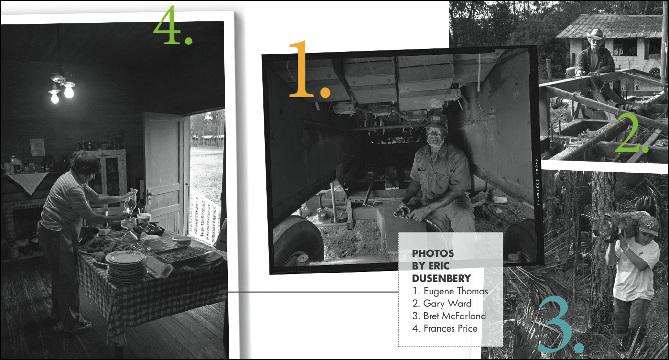There is a lot more to Florida than beautiful beaches and amusement parks. That’s the message of 53-year-old Eric Dusenbery, founder of Cinderic Documentaries, Inc., a DeLand nonprofit organization formed in 2006.
Dusenbery, formerly a commercial/editorial photographer in Orlando, chronicles Florida history with black and white photos. “Our heritage is slipping away,” he says. “Listening to stories and learning about legacies has been replaced by Internet searches, video gaming, and electronic babysitting.”
Dusenbery is trying to change that through Cinderic, an organization named for his wife Cindy and himself. The organization produces all black and white images for emotional appeal. “We produce multimedia segments called docu-MINUTE-aries that incorporate still photographs, music, and audio narratives into a video format,” he says, “but our work is comprised mainly of still photographs (and narrative text panels) in exhibitions and public programs.”
Initially formed to preserve history and traditional culture, Cinderic has evolved to include enhancing and preserving “the community and human spirit.” He combines photography with storytelling. “I like to say that we’re story-listeners — simply having a conversation with someone and recording their thoughts and memories about a subject,” he says, rejecting the phrase oral history as “too scholarly.”
In keeping with his upbringing in rural Illinois, Dusenbery’s focus is on rural issues. “While one of our future projects will be more urban-related, I continue to seek out the stories that bring attention to, and preserve, rural affairs and issues,” he adds. One of his latest projects is a book, Florida Soup: Putting History On The Table, slated for publication this spring. He combines one-part stories with one-part photography in the book, looking at historic cooking habits, food production and the recipes that “defined the family and community in rural and small-town Florida,” he says.
“Florida has a rich harvest of storytellers, from a tobacco-spitting, blue crab fisherman who recounts commercial fishing practices of yesteryear to a rancher who reminisces about Depression-era farming and a few other surprising tales. This is a project on Florida’s love affair with food and storytelling,” Dusenbery explains.
The book will retail for $19.95 and will be sold online, at speaking engagements, traveling exhibits, independent bookstores, and other outlets. Cinderic has been received favorably by Floridians. “People who know of our work seem to realize the importance of documenting and preserving these ways of life,” he observes.
Beth Miller, executive co-chairman of the Mount Dora Center for the Arts, says the arts center will be presenting “Back Road to Back Home: Finding the Voices of the Sunshine State,” a study in rural culture by Dusenbery August 9 through September 27. “His photos capture images of people that live a rural life. Maybe it’s a woman standing in her garden, but the image he captures is of the life that she’s led there,” Miller says. “He captures the character of the people in his work.”
The exhibition, which is free, can be viewed between 10 a.m. to 2 p.m. Monday through Saturday through the exhibition dates at 138 E. 5th Ave., Mount Dora.
“Eric presented the photo documentary to us,” Miller says. “We thought it was an exciting project, especially since Lake County certainly represents rural Florida.”
CREDIT
story by CHERYL ROGERS

